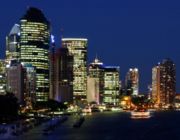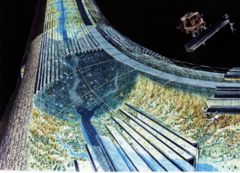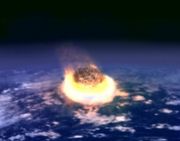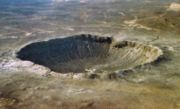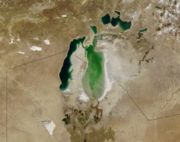Difference between revisions of "Survival of our species"
| Line 17: | Line 17: | ||
{{frame1|Risks to humanity}} | {{frame1|Risks to humanity}} | ||
{{frame1|Being careful with powerful technology}} | {{frame1|Being careful with powerful technology}} | ||
| − | {{frame1| | + | {{frame1|Reducing our impact on the environment}} |
{{frame1|Peace}} | {{frame1|Peace}} | ||
</div> | </div> | ||
{{portalpageend}} | {{portalpageend}} | ||
Revision as of 18:58, 10 February 2007
|
There really couldn't be anything more important to us than the survival of our own species. It means protecting ourselves and future generations. However we currently have all our eggs in one basket which is a precarious situation – we live on this single world while under the shadow of various apocolyptic threats, both man-made and natural, that could destroy our current civilisation and even wipe us out entirely. Ultimately we are extremely vulnerable. Asteroids, virulent disease, global war with advanced weapons – all are possible and we must protect our future.
We've come a long way and gained irreplaceable culture and knowledge in the last hundred thousand years or so, and it would be the most foolish thing in history to lose it at a time when we have the technology to do something about it. Far more likely than total annihilation of our species is the possibility of being knocked back to the Dark Ages. It is not just about surviving but having good prospects, opportunities and a rich environment to live in, and not messing things up for our descendants. It's quite tricky to have an advanced civilisation with no civilisation at all...
Long-term thinking is hugely important because the short-term easy choice often has a negative impact in a longer time-frame. Long-term thinking helps us see the bigger picture. Sometimes to avoid much larger problems further in the future it is necessary to change behaviour and make decisions in the present that might feel tough. There is the story of the man who had a goose that laid a golden egg every day. Every morning he would check the goose's bedding and find another golden egg there, which he would then take to the market to sell. Eventually he thought to himself, "This goose's insides must be full of gold! Why settle for one single egg when I can open up the goose and take it all!" So he took a long knife to the belly of the goose and cut it open, thinking how clever he was to be getting all this extra gold. Much of the thinking behind the way we run our society now is of the same calibre as the man in this story. For example, we are happy to deplete fertile farmland so that we can have bread for this year. Long-term thinking means improving our means of producing resources, rather than just snatching up the resources we need for now. There seems to be many reasons that society tends to have a short-termist attitude:
It is very hard to change the behaviour of large groups of people there is huge inertia to overcome. So what is the big picture, what are we aiming for? We need effective ways to help us all consider the longer time frame. It needs to be something that is explained to children in ways they can understand. We need illustrations of disastrous short-term thinking and the consequences. What are the important long-term issues that we need to think about:
Some people wonder what is the point of heading off into space when we have a wonderful planet to live on that provides all of our needs, and rather usefully has an atmosphere that we can breathe...
One reason is survival. At the moment we have all our eggs in one basket here on Earth. If nothing else, space colonization will be an insurance policy that will allow life to survive on other spaceships should something catastrophic happen to Spaceship Earth. It is also the next great step for life inhabiting a new environment and spreading itself ever wider - something it has been doing for the past 3.7 billion years. Freed from scarcity, Man tends to look for interesting challenges and ways to extend his horizons. What greater adventure could there be than extending life beyond our home planet and reaching out into the stars? On a more pragmatic note, the resources in space of energy, material and living space are effectively unlimited. This will allow our civilisation to constantly expand while taking the burden off the Earth. Just as the New World held the promise of abundant gold and land to settlers of the Americas, space is a frontier filled with unfathomable wealth of all kinds. Simultaneously, it holds the best promise to help ensure our survival, and the most interesting way to extend our reach. It should be a top priority.
Think of all the knowledge we have gained since the stone-age – all our writing systems, mathematics, agriculture, medicine, science, engineering, social systems and so on. It needs to be pretty well looked after, and able to survive huge catastrophes.
If for example there was a large asteroid strike with 95% of the human population wiped out and the environment degraded for decades, the last thing the remaining people need is to be plunged back into another stone age. A large asteroid or comet strike happens rarely, but the consequences are so dire that we must prepare for it. </div> Some potential threats to humanity:
*It is impossible to accurately know when technology might actually reach this level A note about climate change that some people may consider a threat to humanity: this is certainly something that would (and does) affect other species that do not have the means to adapt, but it would not necessarily risk our own survival. We would likely always be able to engineer environments where plants and animals that we rely on, could live. It is obviously a terrible thing to knowingly continue to alter the balance of the environment and we must do everything with in our power to reduce our impact as soon as possible, which the main concepts in this website would be capable of addressing. It sounds a bit grim reading about these things, and most people naturally tend not to give them too much thought, but with awareness of the problems and precautionary measures, these scenarios can be mitigated to a certain extent. Colonising Space is the ultimate insurance policy for humanity, and it needs to happen before it is too late. Leaving it up to bureaucratic, ponderous government programs is not enough. As technology continues to increase in capability and sophistication, the more damage an individual or small group is able to do, and more damaging the consequences are from an accident or oversight. More complex technologies need more complex management. The great spectres of the 20th century were nuclear, biological and chemical weapons - all potential weapons of mass destruction. In the 21st century we will likely add genetics, nanotechnology and robotics - all technologies that could give us even finer controlled weaponry or unforeseen accidents. How do we peacefully benefit from these technologies without increasing the chances of an accident or unstable individuals and fanatical groups using them maliciously? We are part of our environment and have the capability to change it drastically. We are probably not at risk of extinction due to damaging the biosphere but there are plenty of other species that are. The world becomes a poorer place due to our negligence. <p> Acid rain, ozone depletion, air pollution, unsustainable destruction of rain forests, global warming from carbon dioxide emmisions, increasing environmental destruction due to both urbanisation and agriculture are all examples of large-scale changes we have made directly to the environment that hugely affect wildlife and reduce our own quality of life. Currently we only have one home and on behalf of all life we must look after it.</p> Digital technology is reducing our environmental impact. We are moving towards a paperless society, which will greatly reduce our hunger for wood and our need to cut down rainforests.
</div> |
 [print version]
[print version]  [update]
[update]  [site map]
[site map]